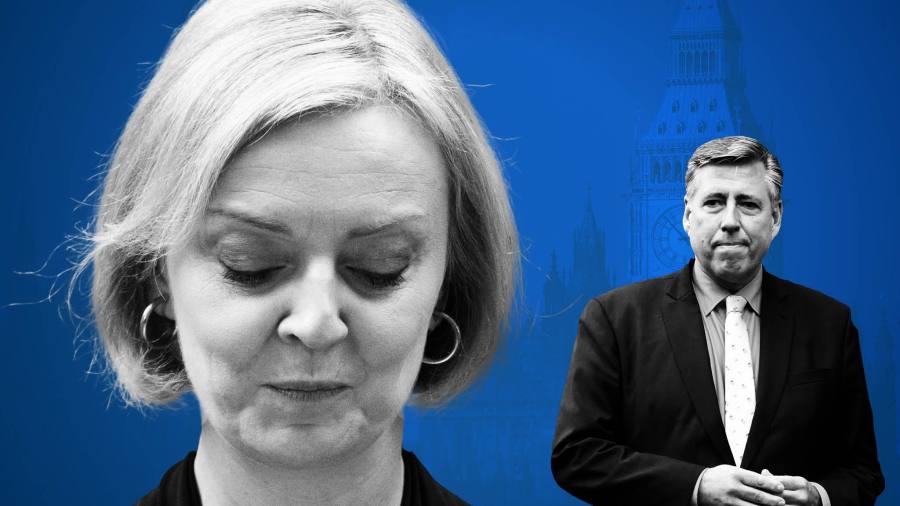
Liz Truss woke on Thursday morning to the realisation that her mayfly premiership had only hours left to run.
In just six weeks, Truss cratered the Conservative party’s poll ratings and unleashed turmoil on financial markets. She was forced into a U-turn on her “mini” Budget involving £45bn of unfunded tax cuts, sacked her chancellor and ousted her home secretary.
Yet on Wednesday she appeared determined to fight on. Under attack from Labour MPs during prime minister’s questions in the House of Commons, she insisted she was “a fighter not a quitter”.
But the seeds of her downfall were sown that day, one of the most chaotic 24 hours in modern British politics.
At 4pm on Wednesday, at a secret location in the Commons, more than a dozen officers of the Tory backbench 1922 committee met to discuss the prime minister’s fate. “Almost everyone said she had to go,” said one attendee.
“The only question was the timing. Some people thought she should stay on until after October 31 for the Budget, but hardly anyone thought she could survive after that,” they added.
Around the time of the 1922 meeting, Suella Braverman — then home secretary and a key figure on the right of the party — reinforced the sense of impending doom when she quit with a withering letter attacking Truss’s leadership.
Later, as dusk fell, the prime minister was embroiled in a fresh row arising from a botched whipping operation over a vote on fracking. As MPs were told they would be sacked for defying the party line, some complained of being manhandled by Tory party whips: close to 20 MPs abstained.
It was the act of a leader who had lost control. “There were people in huddles, all saying the same thing: we had to bring this to an end,” one Tory MP said.
Colleagues said Truss, having slept on things, woke on Thursday realising that the end was approaching. One said: “She was pretty relaxed — there was a weight lifting off her shoulders.”
With MPs rapidly losing confidence, Truss requested a meeting that morning with Sir Graham Brady, chair of the 1922 committee, ostensibly to “take the temperature” of the mood of the party.
Two of Truss’s closest allies — deputy prime minister Thérèse Coffey and party chair Jake Berry — attended the meeting at which Brady delivered the message from Tory MPs that ultimately sealed her demise.
During the one-hour meeting, Brady relayed to the prime minister that a large number of Tory MPs wanted her to quit — and that the 1922 committee mainly agreed with them.
He made clear that although technically under the rules of the committee she was protected from a challenge for 12 months — the grace period for new leaders — Tory MPs could change the rules if necessary.
Presented with this fait accompli, Truss folded. Together, she and Brady agreed that her resignation could allow a new leader to take office before the “Halloween Budget”, when the chancellor is expected to announce fresh tax rises and spending cuts.
Colleagues said Truss seemed “stoical” when she briefed her senior team in Number 10 of her intention to resign. “She didn’t show any cracks in the facade,” said one colleague.
Truss also consulted Hugh O’Leary, her husband. “He fully supported her decision,” said one Number 10 insider.
Just after 1.30pm Truss appeared outside Downing Street to deliver one of the shortest and bleakest resignation statements in modern British history: she was quitting after only 44 days in office.
In her speech — delivered without any visible regret or strong emotion — she noted that she had become leader at a time of “great economic and international instability”, glossing over her own economic missteps.
Truss insisted she had been right to pursue policies to accelerate economic growth, and boasted of her energy support scheme and reversal of the recent rise in national insurance.
At 2.15pm, Brady slipped through the grand doors of the St Stephen’s Entrance to parliament for an impromptu press conference laying out the ground rules for a rapid leadership contest.
Brady would return to the gates three hours later for another urgent press huddle. He was asked by reporters whether he accepted the situation was a “dog’s dinner”. “It’s certainly not a circumstance that I would wish to see,” replied the Tory grandee.